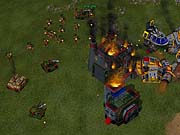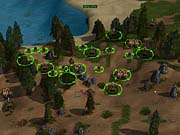Sovereign Q&A
Producer Clint Worley gives us a development update on Verant's Sovereign.
Verant, or Sony Online Entertainment, as the company prefers to be called now, certainly had a respectable showing at this year's E3 in Los Angeles. In addition to showing off the latest builds of recently announced games such as PlanetSide and EverQuest: The Shadows of Luclin, the developer unveiled its impressive massively multiplayer online role-playing game, Star Wars Galaxies. Notably missing from the company limelight, however, was Sovereign, the ambitious massively multiplayer real-time strategy game that Verant announced nearly two years ago. Its low profile on the show floor caused a number of rumors about the state of the game's development to surface. To that end, we tracked down Sovereign's producer, Clint Worley, to discuss how the game has progressed since we last saw it one year ago. Worley was kind enough to sit down with us and answer questions about recent changes to the game, what the Sovereign team took away from E3, and the difficulties that the company might have in developing its first real-time strategy game.

GameSpot: First, we've heard there have been some major changes to the game in the past few months. What prompted you to make these changes, and can you describe which parts of the game the changes affect?
Clint Worley: Sovereign fits into the company goal of making massively multiplayer games for each genre...Sovereign is our real-time strategy game, and with the RTS market being a major player in our consumers' playlist, we want to offer a truly compelling RTS game that features the persistent elements that will create a world that players will want to be playing for many months after launch. There was no one thing that made us step back and reevaluate things with Sovereign. Our goal is to make a competitive real-time strategy game, and the epic size of our title makes things such as design, engine work, as well as network code equally as epic. The engine is the most apparent change to the title. Our lead programmer has taken our engine and created a beautiful playfield with rolling hills and translucent water. We are certain that our players will enjoy looking at the game as much as playing the game.
GS: Have any of the game's features been eliminated in these latest changes? Have any major features been added?
CW: We haven't taken anything out; we have actually been adding things in. We aren't discussing too many of the new features, but one that we are discussing is the "house concept." We have houses in the game that are guild controlled. This allows guilds to challenge over the houses and gain control of the house interests, which in turn dictates the house bonuses. It pits the players against each other and allows players who don't want to get in the mix of things to play the game as merchants or suppliers for the larger houses. The system is incredible, and the gameplay possibilities are endless.
GS: Is there a team of developers dedicated to Sovereign, or are people working on multiple projects at the same time?
CW: Sovereign has a full team of developers--roughly 20.
GS: What is the Sovereign team working on right now?
CW: Getting over the E3 daze. It was nice to see the competition's solutions to inherent problems in the genre.
GS: Sovereign is scheduled for release in mid to late 2002, right? What stage is the game in right now? How much is left to do?
CW: We have a plate full. Making the first true massively multiplayer RTS is not an easy task, and we are striving to hold the Verant quality and playability at the highest level possible.
GS: What specific challenges are involved in making a massively multiplayer strategy game, as opposed to making a massively multiplayer role-playing game?
CW: In a massively multiplayer role-playing game, the players are actual characters that are tracked on the server. In a massively multiplayer real-time strategy game, the players can total hundreds of units or buildings in each game on each server. The difference is magnified dramatically. In both situations, we try to keep the average bandwidth at a minimum to keep costs down, but the RTS scenario makes that a unique challenge.
GS: What kinds of lessons--ones that can be directly applied to the development of Sovereign--has Verant learned in creating EverQuest and its other previous games?
CW: Community, community, community. That is what it is all about. In so many areas of each game, the community requires a strong presence. When you let the players push the limits just slightly, they appreciate each inch, and it helps develop and prolong the entire storyline. Which in turn creates the world that [they] are playing in.
GS: What kinds of advantages and disadvantages do you see in setting the game in a modern-day world?

CW: The game is actually not set in a modern-day world. We decided that although you get the added benefit of having your tech tree and unit list done for you, you can't stray from reality without conflict. We felt that it would help the designers and the art staff to have a setting in the Sovereign universe that has been created by our designers.
GS: Can you describe the universe you have created? How does it differ from a modern-day world? Is it closer to science fiction?
CW: It is closer to science fiction, and it revolves around a future regressive storyline. Many of the technologies that the players will be researching were available at one time in the past, but due to a large-scale battle, almost all of the technology was lost and [therefore] must be reacquired. It does not have any ties to the real world and/or Earth. Due to the overwhelming amount of content that is required to sustain a persistent game, we decided that it would be better for the designers and the artists as well to have the freedom of an imaginative storyline and universe. The back story is intriguing and will play a key role in the progression of the game after launch.
GS: EverQuest has had a series of expansions and a fairly constant stream of minor patches and fixes. Do you envision the same kind of postretail development process for Sovereign?
CW: Sovereign, along with each persistent game that leaves the Verant development house, will be maintained with a full "live" staff, as well as tech ops for immediate concerns. Persistent games require a level of maintenance that Verant recognizes and has plans to support. New content and storyline progression is the key to success within a persistent world.
GS: How was the game received at E3? We heard you brought the game out on the show floor for an hour or so on the third day. Were you pleased with the response?
CW: We were very pleased with the response. We love the look on people's faces when they see the orbital view, and with the new changes that the engine has received, the battles on the planet surface are beautiful. Soldiers run through the trees to join the fray, tanks and missile platforms launch shells and missiles at the enemy buildings, leaving a smoking heap of remains. The game is truly shaping up, and we are looking forward to inviting the public to the biggest RTS game ever!
GS: Thanks for your time, Clint.
Got a news tip or want to contact us directly? Email news@gamespot.com
Join the conversation